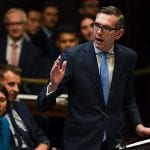Around The Web
Australia needs more than a single page EV strategy to cut transport emissions
 EV can help to significantly lower global transport emissions, but governments must develop the strategies to ensure they can achieve their full potential.
EV can help to significantly lower global transport emissions, but governments must develop the strategies to ensure they can achieve their full potential.
The post Australia needs more than a single page EV strategy to cut transport emissions appeared first on RenewEconomy.
Eskilstuna: how a Swedish town became the world capital of recycling
The city was dying. Then somebody had a great idea to save it – make it the greenest place on Earth
‘People talk about Eskilstuna as the place where nothing new is invented,” says the shopping mall manager Anna Bergström. An hour’s train ride from Stockholm, the “Sheffield of Sweden” has had something of an image problem in recent years. Once a steel-producing powerhouse, the town has fallen on hard times, thanks to the rapid decline in the industry throughout the 1970s. It now has an unemployment rate that is almost double the national average of 8%.
But the town has come up with an answer: recycling. Far from the Scandinavian stereotype of glossy modernity, Eskilstuna’s wide-paved, near-deserted grey streets are populated by kitsch 1980s pizzerias, workers’ cafes and gloomy pubs – not a place where you would expect to find such a radical approach to the environment. Yet since 2012, Eskilstuna has implemented a spate of green initiatives, vying to make it the most environmentally friendly city in Sweden – and perhaps the world. Public buses and cars are run on biogas and electricity, and the town uses low-carbon combined heat and power plants, which use the thermal energy from electricity production to heat water. Residents sort their waste into seven multicoloured categories at home – green for food, pink for textiles, grey for metal, yellow for paper, blue for newspaper, orange for plastic and black for mixed – and for the past four years people have been able to drop off their unwanted goods for recycling at Bergström’s secondhand mall.
Continue reading...'Epic photo': huntsman spider eats pygmy possum in Australia
It’s a ‘fairly rare’ event, arachnology expert says, as it’s more common to see huntsman eat small birds or frogs. Prepare for Tasmania’s spider possum
Pygmy possums usually aren’t on the menu for huntsman spiders.
But an Australian man from Tasmania has captured the rare moment a huntsman attempted to devour a tiny possum at a lodge in the Mount Field national park, 64 km north-west of Hobart.
Continue reading...Oregon House sends on ETS legislation after marathon session
NSW Budget: Coalition misses opportunity to invest in state’s energy sector
 Government investment in clean energy projects could improve budget bottom line, as well as helping to tackle climate change.
Government investment in clean energy projects could improve budget bottom line, as well as helping to tackle climate change.
The post NSW Budget: Coalition misses opportunity to invest in state’s energy sector appeared first on RenewEconomy.
The Driven Podcast: When electric vehicles meet the solar industry
 You know electric vehicles are entering the mainstream when they form a major highlight of solar expos. Nigel Morris tells us what he found at Munich’s Intersolar event.
You know electric vehicles are entering the mainstream when they form a major highlight of solar expos. Nigel Morris tells us what he found at Munich’s Intersolar event.
The post The Driven Podcast: When electric vehicles meet the solar industry appeared first on RenewEconomy.
Synergy caught between high gas costs and falling renewable prices
 WA Government owned Synergy has forecast substantial losses as the emergence of cheap renewables squeezes its coal and gas heavy fleet out of the market.
WA Government owned Synergy has forecast substantial losses as the emergence of cheap renewables squeezes its coal and gas heavy fleet out of the market.
The post Synergy caught between high gas costs and falling renewable prices appeared first on RenewEconomy.
CP Daily: Monday June 17, 2019
Fast transition to renewables would be cheaper and reduce coal ramping risks
 Modelling shows that a faster transition to a high renewables grid would be cheaper and more efficient than a slow transition.
Modelling shows that a faster transition to a high renewables grid would be cheaper and more efficient than a slow transition.
The post Fast transition to renewables would be cheaper and reduce coal ramping risks appeared first on RenewEconomy.
South Australia to unlock hidden value of big batteries in storage tender
 South Australia storage tender to focus on unlocking battery storage value streams not recognised by Australia's electricity market.
South Australia storage tender to focus on unlocking battery storage value streams not recognised by Australia's electricity market.
The post South Australia to unlock hidden value of big batteries in storage tender appeared first on RenewEconomy.
Atlantic Ocean 'running out of breath'
Victoria school trials solar electric car charger
![]() Victorian college installs solar powered electric vehicle charger with view to go off grid and power staff and parents' cars.
Victorian college installs solar powered electric vehicle charger with view to go off grid and power staff and parents' cars.
The post Victoria school trials solar electric car charger appeared first on RenewEconomy.
First lot of Tesla Model 3 EVs spotted arriving in UK
 The Driven The first batch of all-electric Tesla Model 3 sedans have been spotted on car transport trucks in the UK, as the best-selling electric car arrives in its first right-hand drive market. A number of bright red models of the long-awaited “mass-market” electric car were seen being transported towards London on the M20 on...
The Driven The first batch of all-electric Tesla Model 3 sedans have been spotted on car transport trucks in the UK, as the best-selling electric car arrives in its first right-hand drive market. A number of bright red models of the long-awaited “mass-market” electric car were seen being transported towards London on the M20 on...
The post First lot of Tesla Model 3 EVs spotted arriving in UK appeared first on RenewEconomy.
Dogs' eyes evolve to appeal to humans
Ministers 'reject' report's fast fashion advice
Inside Heathrow's high-tech baggage system
How to avoid the looming waste crisis from Australia’s solar energy boom
 What happens to solar panels and batteries at the end of their life? Australia's booming residential PV and storage market means this a problem we have to solve.
What happens to solar panels and batteries at the end of their life? Australia's booming residential PV and storage market means this a problem we have to solve.
The post How to avoid the looming waste crisis from Australia’s solar energy boom appeared first on RenewEconomy.



